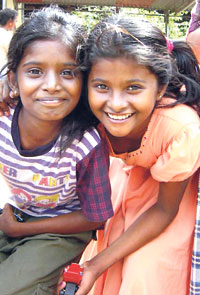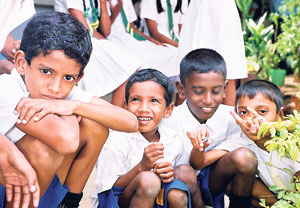
| Young people ‘gederata nakiwenawa’ while governments think up solutions
Clock is ticking “The world is facing a youth bulge, where the 12-24 age group is larger than ever. Some see this as a fiscal and economic risk because governments have to allocate a lot of resources to take care of them. But this is also an opportunity because of the increase of workforce creating an opportunity to invest in other things. However, this window of opportunity is open only for about 40 years depending on fertility rates, and then ageing will close this window,” said the country director of the World Bank Sri Lanka, Naoko Ishii, speaking at this week’s launch of the Bank’s latest World Development Report titled Development and the Next Generation. “In countries like Japan and Italy this window of opportunity closed about a decade ago. In developing countries like India and Bangladesh the window will remain open for another 3 decades. In Sri Lanka the window of opportunity will close within a decade. So you must seize this opportunity quickly,” said Ishii. But at a time when the labour force should absorb as much young people as possible, what is happening in Sri Lanka is the opposite. Educated but unemployed Unemployment is highest among O/L and A/L qualified young people. “There is a high degree of educated youth unemployment. But a World Bank study at the University of Colombo done in 2006, shows that degree holders waste years at home before finding jobs. Connections, not merit “64% of young workers reported that they were recruited through recommendations of their friends and relatives. These contacts were often based on social and family networks including old school networks. The need for connections was more deeply felt for employment in the private sector, where the correct social connections and a shared cultural ideology were seen as basic requirements,” said World Bank Senior Social Protection Economist, Milan Vodopovic, citing a previous research (Mayer and Salih, 2005). The World Bank study at the Colombo University too, notes that graduates from lower social economic strata find it more difficult to get jobs. “So there is still use of contacts to get jobs when we would rather see more merit based hiring,” said Vodopovic. Government jobs “Government ad-hoc recruitment policies also contribute their share to queuing and thus to unemployment,” said Vodopovic. The World Bank points to the restrictions on terminating workers in the private sector, as another indirect contributor to unemployment. The bank says that since companies cannot hire and fire at will, they also generate fewer jobs. Youth plan |
| || Front
Page | News
| Editorial
| Columns
| Sports
| Plus
| Financial
Times | International
| Mirror
| TV
Times | Funday Times | ST - 1 || |
| |
Copyright
2007 Wijeya
Newspapers Ltd.Colombo. Sri Lanka. |
 Young people in Sri Lanka find it harder to find employment and employment is still dependent on ‘connections’ rather than merit. Meanwhile Sri Lankan society is transforming into an aging population and the country is running out of time to harness the resource of ‘youth’.
Young people in Sri Lanka find it harder to find employment and employment is still dependent on ‘connections’ rather than merit. Meanwhile Sri Lankan society is transforming into an aging population and the country is running out of time to harness the resource of ‘youth’.  Youth unemployment in Pakistan and India is also high, but it is less than 10%. So the situation of youth unemployment in Sri Lanka is very, very serious,” said Ishii.
The Youth Employment Network (YEN) in the Ministry of Youth Affairs says that 71% of the unemployed in Sri Lanka are young men and women between the ages of 15-25 years.
Youth unemployment in Pakistan and India is also high, but it is less than 10%. So the situation of youth unemployment in Sri Lanka is very, very serious,” said Ishii.
The Youth Employment Network (YEN) in the Ministry of Youth Affairs says that 71% of the unemployed in Sri Lanka are young men and women between the ages of 15-25 years.